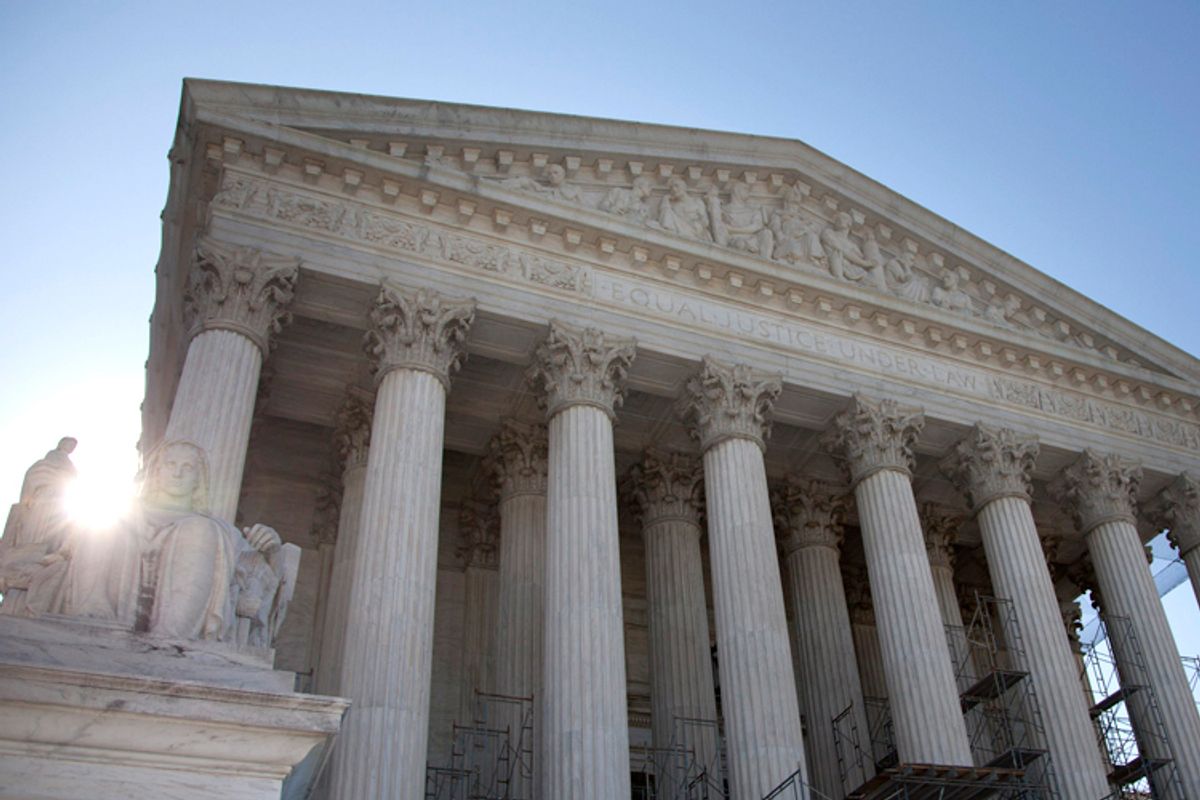It’s no secret that the Voting Rights Act is in trouble. Conservative activists, long opposed to affirmative action and voting rights protections for minorities, argue that the blatant disenfranchisement that drove the act’s creation is a thing of the past. Where poll taxes, literacy tests and sheer terror kept African-American voters from the polls, now they enjoy unprecedented access to the ballot, black candidates across America hold office in record numbers, and Barack Obama easily won a second term as president. “We are now a very different nation,” Chief Justice John Roberts himself has observed. “Things have changed in the South.”
But have they? In 2008, Shelby County’s own city of Calera eliminated a black majority district by adding white subdivisions, defeating its only black councilman, until the Justice Department stepped in under Section 5 of the Voting Rights Act. Section 5 requires nine states (including Alabama and others mostly in the South) and places in seven other states with past records of discrimination to submit proposed changes to voting practices to the federal government. Calera was required to revise its boundaries to include the black voters it had eliminated and the black councilman was easily reelected. Nevertheless, Shelby County litigators now insist that Section 5 is no longer necessary and claim that Congress acted improperly when it last renewed the act in 2006.
Other conservative justices agree, and the civil rights community fears that the Court will eliminate Section 5 when it announces its decision as expected this summer. If Section 5 is struck down, cities like Calera would be permitted to engage in flagrant gerrymandering, which would create a form of political segregation the Voting Rights Act was designed to prevent.
But the act’s future may not be as dire as it seems. The history of the civil rights movement in the 1960s suggests that the best friends of the movement were often its enemies. The historical parallels are plain, provided one knows where to look.
One day after oral arguments concluded in Shelby County v. Holder, thousands gathered in Selma, Ala., for the annual remembrance of the event that led to the passage of the Voting Rights Act. On March 7, 1965, a day later remembered as “Bloody Sunday,” civil rights activists, demonstrating for voting rights, were savagely attacked by Alabama state troopers and vigilantes commanded by Selma’s sheriff, Jim Clark, as they tried to cross the Edmund Pettus Bridge. When someone called for an ambulance, Sheriff Clark said, “Let the buzzards eat them.”
That night, ABC News interrupted its Sunday Night Movie, "Judgment At Nuremberg," an Academy Award-winning film about the trials of Nazi war criminals, to inform the nation. The raw footage shown had no narration and ran for 15 minutes. Viewers, estimated at 48 million, were stunned by the sight of peaceful demonstrators being beaten and tear-gassed.
Others who later saw pictures of the tragedy had similar reactions — horror, shame and an overwhelming desire to do something. Thousands poured into Selma. Those who could not go South demonstrated in their own communities, from Maine to Hawaii.
Washington was besieged by demonstrators calling for a Voting Rights Act. President Johnson was sympathetic to their demand but had been hesitating to act because he had signed the Civil Rights Act of 1964 the previous July, and believed that Congress was not yet ready to pass another law so soon.
Bloody Sunday changed everything. LBJ later called it “a turning point in man’s unending search for freedom” and submitted a tough voting rights bill, which the Congress enacted on Aug. 6, 1965. Over the following 48 years, the act was renewed by Congress four times under Republican Presidents Nixon, Ford, Reagan and George W. Bush.
Bloody Sunday wasn’t the first time opponents of the civil rights movement had unwittingly played into its hands. When Bull Connor’s police dogs attacked demonstrators in Birmingham in 1963 the result was the Civil Rights Act of 1964. “The civil rights movement should thank God for Bull Connor,” President Kennedy remarked at the time. “He helped it as much as Abraham Lincoln.”
This strange irony at the heart of the voting-rights struggle has endured since the movement’s heyday in the 1960s. Recent attempts to suppress the minority vote, led by many of the Southern states that are fully covered by the Act, aroused those about to be victimized to fight back with lawsuits that successfully challenged voter IDs, prohibitions against early voting, and restrictions on registering new voters. The result was a massive turnout, which contributed to Barack Obama’s impressive victory.
Thus history suggests that should the Court emasculate the Voting Rights Act by eliminating Section 5, disenfranchised Americans and their allies will again come together, this time to force Congress to strengthen the act and hopefully extend it to states where discrimination exists, but that are not presently covered by the act. Will a Republican Congress oppose a new Voting Rights Act? Or will the party see it as a golden opportunity to demonstrate to the growing minority population that it too seeks a just electoral system? Those who oppose such reforms may well find themselves defeated for reelection in 2014.
The voting wars are far from over. Every day brings a new scheme—apportioning electoral votes by congressional district is the most recent. The Voting Rights Act’s Section 5 remains an essential tool to fight these blatant attempts to disenfranchise American citizens. So, too, do the schemes themselves, which have historically aroused the nation to approve the most important civil rights acts in American history. That is a lesson that opponents of the Voting Rights Act would do well to remember.



Shares